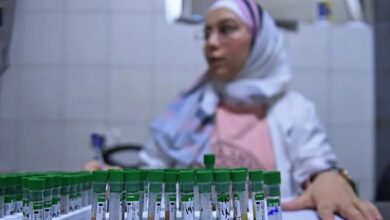Trial begins of 22-year-old German woman who joined IS group in Syria
The trial of Leonora Messing, a German woman who moved to Syria as a 15-year-old to join the Islamic State group opened behind closed doors on Tuesday, as she stands accused of aiding and abetting crimes against humanity.

Messing, now aged 22, is in the dock in the eastern German city of Halle on suspicion that she and her IS husband enslaved a Yazidi woman in Syria in 2015.
In the trial scheduled to last until at least mid-May, Messing is also facing charges of membership of a terrorist organisation and weapons law violations.
The high-profile case has prompted soul searching in Germany about how a teenage girl from a small town became radicalised and joined the Islamist cause.
The young woman ran away from her home for the IS-controlled part of Syria in March 2015.
After reaching Raqa, then the de facto “capital” of IS in Syria, she became the third wife of a German national and known jihadist.
Messing’s father, a baker from the German village of Breitenbach, only learned his daughter had converted to a radical brand of Islam by opening her abandoned computer and reading her journal after her disappearance.
Six days after she vanished, her father received a message informing him his daughter “chose Allah and Islam” and that she had “arrived in the caliphate”.
“She was a good student,” her father, Maik Messing, told local media in 2019.
“She used to go to a retirement home to read to the elderly. She took part in the carnival as a majorette. That was when a lot of the people we know saw her for the last time.”
Messing had been living a double life and was visiting, apparently without her parents’ knowledge, a mosque in the western city of Frankfurt that was in the crosshairs of Germany’s domestic intelligence service.
She is among the more than 1,150 Islamists who left Germany from 2011 for Syria and Iraq, according to government findings.
Her case has attracted particular scrutiny due to her young age, and because her father agreed to be followed for four years by a team of reporters from public broadcaster NDR.
As part of the report, he made public thousands of messages he continued to exchange with his daughter, offering rare insights into daily life under IS, but also eventually her attempts to break free.
Prosecutors say Messing took part in human trafficking after her husband “bought” and then “sold” a 33-year-old Yazidi woman.
Messing, who had given birth to two small girls, wound up detained in a Kurdish-controlled camp in northern Syria.
Her husband, Martin Lemke, was captured in 2019 by the Syrian Democratic Forces, the Kurdish administration’s de-facto army, two of his wives revealed at the time.
In December 2020, Messing was repatriated in one of four operations bringing a total of 54 people, most of them children, back to Germany.
Messing was arrested upon her arrival at Frankfurt airport but later released.
Germany has repeatedly been ordered by its courts to repatriate the wives and children of jihadists.
A Berlin tribunal had ruled in October 2019 that a German woman and her three children must be brought back, arguing that the minors were traumatised and should not be separated from their mother.
There are an estimated 61 Germans still in camps in northern Syria, as well as around 30 people with a link to Germany, according to official estimates.
A German court in November issued the first ruling worldwide to recognise crimes against the Yazidi community as genocide, in a verdict hailed by activists as a “historic” win for the minority.
The Yazidis, a Kurdish-speaking group hailing from northern Iraq, have for years been persecuted by IS militants who have killed hundreds of men, raped women, and forcibly recruited children as fighters.
AFP





